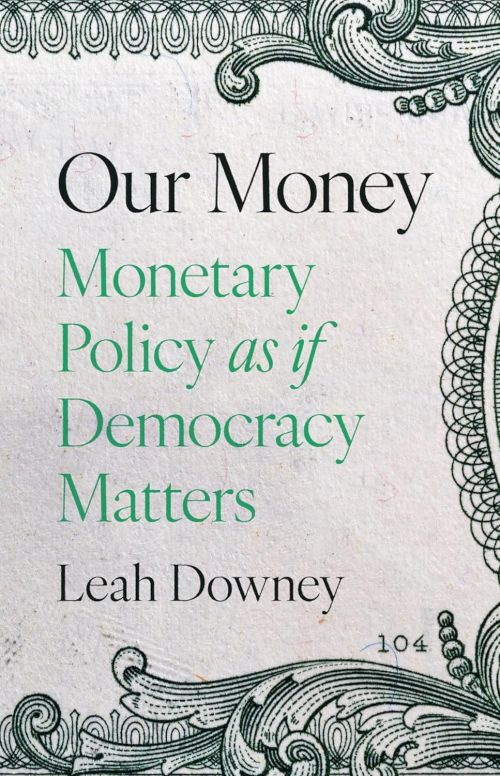14 April 2025
Our Money
Monetary Policy as if Democracy Matters
Leah Downey
2025, Princeton University Press, 264 pages,
ISBN 9780691244433
Reviewer: Geoff Crocker, Author, Rethinking Income and Money

Central bank independence is an article of faith in contemporary monetary policy. Its main justification is to prevent politicians from irresponsible expenditure for electoral gain. It’s a questionable claim given that the same governments are trusted with other serious responsibilities. It also potentially leaves a democratic deficit, since total independence avoids accountability.
Leah Downey addresses this concern. She points out that ‘the power to create money belongs to the state’ (p3) but that this has been thrice delegated i) from the electorate to government ii) from government to the central bank, then iii) to private commercial banks (p92). The democratic problem is that policy set by government has to be translated into regular operational practice and often involves technical complexity. Government therefore sets a mandate for its operating agencies, including its central bank. Nevertheless, the central bank can conceivably use its independent monopoly on monetary policy to counteract government fiscal policy and frustrate its political objectives (p26ff).
Downey usefully reviews the political theory from Rousseau, Rodick, Rey et al on democracy legitimately creating bureaucracy (chapter 4), but questions how citizens can ‘take back control from experts and bureaucrats’ (p88). Her main proposal is for ‘iterative monetary policy’ (chapter 6) whereby government regularly reviews its central bank’s remit, directs credit priorities, applies differential reserves requirements etc. Her focus is on process rather than on actual practice. She shows how central bank mandates have shrunk to a 2% inflation control target, using the sole tool of the interest rate. She offers no critique of this simplicity, neither does she suggest how this theory could be debated and reset democratically. She documents how commercial banks create money, with government forced to borrow from the same system, without critiquing the seigniorage commercial banks gain. On QE, she notes that the Fed paid $116.3bn to commercial banks as interest on QE reserves which the Fed had itself created (p22), but omits any core critique of QE/QT. In the UK, the BoE created £875bn of reserves in commercial banks to purchase long term 2% fixed interest bonds from pension funds et al. The BoE paid variable rate interest on these reserves, thus losing a margin which peaked at 3%, and through its HM Treasury indemnity, charged £26bn annually to public funds. This has since reduced to a £16bn annual charge from BoE sale of bonds, made at a substantial capital loss, together with the reduction of the interest rate.
The complexity of this system means that it is below the public radar, and therefore beyond electoral challenge. The Parliamentary Treasury committee can and does hold the BoE to account, but, given limited expertise, ineffectively. The BoE is not allowed to purchase government debt in the primary market, but only in the secondary market from primary traders, who are estimated to have gained a £5bn margin from this trade. Direct money financing of government expenditure is prohibited, although BoE purchase of its own government’s debt achieves an equivalent outcome. These major impacts challenge the democratic legitimacy of BoE independence. Downey is surely right in saying that such practices and outcomes should be widely known, understood, critiqued in public debate, and subject to Parliamentary control.
